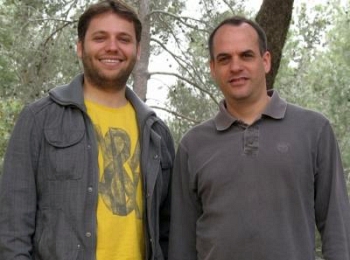| | 02 May, 2012
| | Researchers at Hebrew University identify genetic systems disrupted in autistic brain | |
 | | Eyal Ben-David (left) and Dr. Sagiv Shifman of the Hebrew University of Jerusalem are researchers on autism genetics |
|
Autism has a strong genetic basis, but so far efforts to identify the responsible genes have had mixed results. The reason for this is that autism is influenced by many different genes, and different genes are involved in different individuals, making it hard to find the common genetic ground between patients.
Now, research conducted at the Hebrew University of Jerusalem has shown that despite this fact, the different genes involved in autism tend to be involved in specific processes in the brain. This can explain, on the one hand, similarities in the behavioral symptoms of different autistics, but also the large spectrum of behaviors observed in different autistic individuals.
The Hebrew University research, conducted by Dr. Sagiv Shifman and his doctoral student Eyal Ben-David of the Department of Genetics at the Alexander Silberman Institute of Life Sciences, has potential implications for early diagnosis as well as for treatment of autism in the future. The study was recently published in the journal PLoS Genetics (http://www.plosgenetics.org/doi/pgen.1002556).
Autism spectrum disorders are neurodevelopmental syndromes characterized by social deficits, language impairments and repetitive behaviors. Recent studies indicate that autism is considerably more common than previously supposed, with a prevalence rate that is high as 1% in some regions.
The main goal of the Hebrew University project was to test the contribution of rare genetic mutations, as well as the genetic variations which are common in the population, and to see whether these different types of genetic risk factors are related. Instead of testing individual genes, the researchers chose to study gene collections, in an attempt to understand general pathways involved in autism.
To that end the scientists constructed a network based on the expression pattern of genes across different brain areas. This allowed them to discover groups of genes with shared function in the brain. Next, based on genetic data from thousands of families with autistic children, the researchers studied the contribution of different groups of genes to autism.
To their surprise, they found -- when looking at mutations found in autism as well as thousands of common gene variants that are more frequently seen in autistics -- that these mutations and variations are located in specific functional groups.
When looking at families with one autistic individual (sporadic cases), and in families where there is more than one affected individual (multiplex cases), the same variants were seen acting in both cases.
These groups of genes are highly active in the first
year of life, and are involved in processes of learning, memory, and sensory perception.
The Hebrew University scientists believe that their work could pave the way for large-scale genetic scans in the future that could allow for early diagnosis of autism. Further, the results of their study provide a ray of hope that by concentrating on specific gene groups, it will one day be possible to design drugs which could alleviate symptoms in autistics with different genetic backgrounds.
|
|


